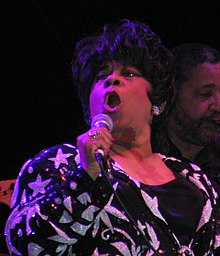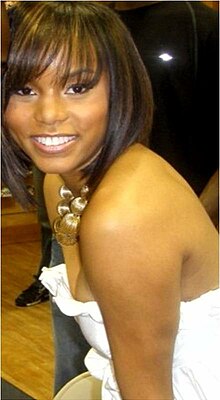Introduction

Rhythm and blues, frequently abbreviated as R&B or R'n'B, is a genre of popular music that originated within African-American communities in the 1940s. The term was originally used by record companies to describe recordings marketed predominantly to African Americans, at a time when "rocking, jazz based music ... [with a] heavy, insistent beat" was becoming more popular. In the commercial rhythm and blues music typical of the 1950s through the 1970s, the bands usually consisted of a piano, one or two guitars, bass, drums, one or more saxophones, and sometimes background vocalists. R&B lyrical themes often encapsulate the African-American history and experience of pain and the quest for freedom and joy, as well as triumphs and failures in terms of societal racism, oppression, relationships, economics, and aspirations.
The term "rhythm and blues" has undergone a number of shifts in meaning. In the early 1950s, it was frequently applied to blues records. Starting in the mid-1950s, after this style of music had contributed to the development of rock and roll, the term "R&B" became used in a wider context. It referred to music styles that developed from and incorporated electric blues, as well as gospel and soul music. From 1960s to 70s, some British groups were referred to and promoted as being R&B bands. By the 1970s, the term "rhythm and blues" had changed once again and was used as a blanket term for soul and funk. (Full article...)
Selected article
"Baby Boy" is a song by American singer Beyoncé featuring Jamaican deejay Sean Paul, from her debut solo studio album, Dangerously in Love (2003). It was also included on the reissue of Paul's second studio album, Dutty Rock (2002). Both Beyoncé and Paul co-wrote the song with Robert Waller, Jay-Z and Scott Storch, who produced it with Beyoncé. Containing a lyrical interpolation of "No Fear" by hip-hop group O.G.C., "Baby Boy" is a dancehall and R&B song with Caribbean and Asian influences; its lyrics detail a woman's fantasies.
The song was released as the second single from Dangerously in Love on August 3, 2003, by Columbia Records and Music World Entertainment. "Baby Boy" topped the US Billboard Hot 100 for nine consecutive weeks and was Beyoncé's longest-running number-one single until 2007, when it was surpassed by "Irreplaceable". It reached the top-ten in many countries and was certified two-times platinum by the Australian Recording Industry Association (ARIA) and platinum by the Recording Industry Association of America (RIAA). "Baby Boy" also reached the top-ten in Australia, Belgium, Denmark, France, Germany, Hungary, Ireland, the Netherlands, New Zealand, Norway, Spain, Sweden, Switzerland and the United Kingdom.
The accompanying music video for "Baby Boy" was directed by Jake Nava and mostly shows Beyoncé dancing in various locations. The song has remained a staple of Beyoncé's concert setlists. The American Society of Composers, Authors and Publishers (ASCAP) recognized it as one of the most played songs of 2004. The next year, American singer-songwriter Jennifer Armour filed a copyright infringement lawsuit claiming that "Baby Boy" had used the primary musical hook from her song "Got a Little Bit of Love for You". The case was later dismissed. (Full article...)
Topics
Featured Articles

Featured articles: "Baby Boy" · "Déjà Vu" · "Halo" · "Irreplaceable" · Janet Jackson · Michael Jackson · Mariah Carey · Sly & the Family Stone · Sons of Soul · The Supremes · Thriller · The Way I See It
Good articles: Afrodisiac · "Burn" · "Caught Up" · Christina Milian · Confessions · "Forgive Me" · FutureSex/LoveSounds · "Get Me Bodied" · "Green Light" · House of Music ·I Want You · LeToya Luckett · Let's Get It On · "Lose My Breath" · Maxwell's Urban Hang Suite · Modern Sounds in Country and Western Music · "My Boo" · My World · "Naughty Girl" · Nina Simone · Off the Wall · "Ring the Alarm" · Soul Food Taqueria · There's a Riot Goin' On · "Untitled (How Does It Feel)"· Voodoo · "We Belong Together" · "What Goes Around.../...Comes Around" · Winter in America · "Yeah!"
WikiProjects
Selected biography -
LeToya Nicole Luckett (born March 11, 1981) is an American R&B singer and actress. She rose to fame in the late 1990s as a founding member of the R&B girl group Destiny's Child, one of the world's best-selling girl groups of all time. As a member of Destiny's Child, she achieved four US Top 10 hit singles, "No, No, No", "Bills, Bills, Bills", "Jumpin', Jumpin'", and "Say My Name", and won two Grammy Awards. In the 2000s, she began her solo career after leaving the group and signing a record deal with Capitol Records. Her solo debut album, LeToya (2006), debuted at number-one on the U.S. Billboard 200 chart, and was certified platinum by the RIAA, that same year.
The lead single, "Torn", reached the Top 40 in the U.S., and set records on BET's top ten countdown show 106 & Park. Luckett was awarded Top Songwriter at the 2006 ASCAP Rhythm and Soul Awards, and was nominated for Outstanding New Artist at the 2007 NAACP Image Awards. Luckett's second solo album, Lady Love (2009), debuted at number-one on the U.S. Top R&B/Hip-Hop Albums chart. (Full article...)General images -
Related portals
Subcategories
Associated Wikimedia
The following Wikimedia Foundation sister projects provide more on this subject:
-
Commons
Free media repository -
Wikibooks
Free textbooks and manuals -
Wikidata
Free knowledge base -
Wikinews
Free-content news -
Wikiquote
Collection of quotations -
Wikisource
Free-content library -
Wikiversity
Free learning tools -
Wiktionary
Dictionary and thesaurus
Things to do
|
Sources
- ^ "Ruth Brown, the Queen of R&B, was born 93 years ago today". Frank Beacham's Journal. Archived from the original on January 24, 2021. Retrieved 2021-01-18.















































